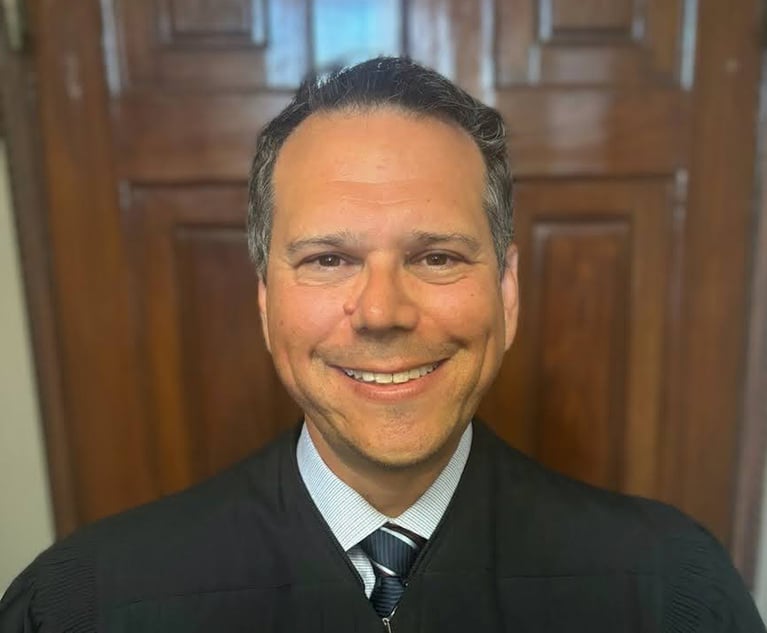Georgia Voters Seek Emergency Order Barring Kemp From Election Duties
Already a defendant in multiple lawsuits stemming from the state's policies on processing voter registrations, absentee ballots and election security, Brian Kemp, the Republican candidate for governor, is named in a new suit seeking to strip him of any continuing involvement in the midterm election.
November 06, 2018 at 06:46 PM
4 minute read
 Georgia Secretary of State Brian Kemp. (Photo: John Disney/ ALM)
Georgia Secretary of State Brian Kemp. (Photo: John Disney/ ALM)
Five voters in three Georgia counties filed an emergency lawsuit late Tuesday in federal court in Atlanta asking a judge to bar Secretary of State Brian Kemp from continuing to use the powers of his office to influence the 2018 general election.
Kemp, the Republican candidate for governor, has ignored repeated calls from Democrats and voting rights organizations to step down as the state's chief election officer while he campaigns for the state's highest office. Those calls intensified this week after Kemp announced he had launched a criminal investigation of the state Democratic Party in connection with information shared with his outside counsel, warning that the state voter registration web page was vulnerable to hackers.
Read the complaint: [falcon-embed src="embed_1"]
The emergency petition was filed two hours before the polls closed by former U.S. Attorney for the Middle District of Georgia Michael Moore, now a partner at Pope McGlamry in Atlanta; Atlanta attorney Bryan Sells, a former voting rights lawyer with the U.S. Justice Department; and attorneys with the nonpartisan, nonprofit organization Protect Democracy. It seeks an immediate temporary restraining order that would bar Kemp from any involvement in vote counting, certification of election results or any runoff or recount procedures—all normally responsibilities that the secretary of state would oversee.
The suit cites Kemp's decision to open an investigation of the state Democratic Party based on what it calls an unfounded accusation and post notice of the allegation on his official state website while promoting it via his political campaign as a reason the TRO is needed.
“No person should be a judge in their own case is about as basic a rule of fairness as you can get,” said Larry Schwartztol, counsel for Protect Democracy. “That principle, embodied in the Constitution's Due Process Clause, applies with special force to Secretary Kemp, who has misused his official position to try to tilt the playing field of the election in his favor.”
The emergency petition also cites two recent rulings by two federal judges in Atlanta changing policies imposed by Kemp's office regarding absentee ballot rejections and voter registrations by newly minted citizens that have been held in abeyance rather than processed.
“Whoever you support in an election, we should all be able to agree that it's essential for a democracy for that election to be administered fairly,” Moore said.
“Allowing one of the candidates to not just preside over their own election but misuse their office to give them an unfair advantage is just anti-democratic and unlawful,” Sells added.
Kemp spokeswoman Candice Broce said Kemp has been notified of the suit. “This twelfth-hour stunt will not distract us from fulfilling our responsibilities and working with county officials to ensure a secure, accessible, and fair election for all eligible Georgians.”
“The Secretary of State's office does not count votes; counties do,” Broce said. “The Secretary of State's office does not re-count votes; counties do.”
The TRO request was the second suit filed against Kemp on Tuesday, with Common Cause of Georgia seeking an injunction to ensure that provisional ballots are properly counted. Citing publicized “security vulnerabilities” in the state's antiquated computer voting system that Kemp's office was alerted to over the weekend, the nonprofit suggested that voter registration data could easily be changed or canceled, potentially stripping legitimate voters of their right to vote.
The Common Clause suit was filed by Christopher Campbell of DLA Piper in Atlanta, a team of lawyers with New York's Paul, Weiss, Rifkind, Wharton & Garrison and the Brennan Center for Justice at New York University School of Law. It alleges that, instead of focusing on patching weaknesses in the website, Kemp “instead waged a political counter attack against the Democratic Party.” In so doing, Kemp “recklessly exposed voters to potential tampering with their voter registration records.” Maintaining an unsecure voter registration database and publicizing those vulnerabilities, the lawsuit claims, violates federal and state election laws.
This content has been archived. It is available through our partners, LexisNexis® and Bloomberg Law.
To view this content, please continue to their sites.
Not a Lexis Subscriber?
Subscribe Now
Not a Bloomberg Law Subscriber?
Subscribe Now
NOT FOR REPRINT
© 2025 ALM Global, LLC, All Rights Reserved. Request academic re-use from www.copyright.com. All other uses, submit a request to [email protected]. For more information visit Asset & Logo Licensing.
You Might Like
View All
Litigators of the Week: Simpson Thacher and ACLU Team To Challenge Louisiana's Ten Commandments Law

A Reporter and a Mayor: Behind the Scenes During the Eric Adams Indictment News Cycle

Even With New Business Courts, Texas Is a Long Way from Taking Delaware's Corporate Law Mantle
5 minute read
Trending Stories
- 1'A Death Sentence for TikTok'?: Litigators and Experts Weigh Impact of Potential Ban on Creators and Data Privacy
- 2Bribery Case Against Former Lt. Gov. Brian Benjamin Is Dropped
- 3‘Extremely Disturbing’: AI Firms Face Class Action by ‘Taskers’ Exposed to Traumatic Content
- 4State Appeals Court Revives BraunHagey Lawsuit Alleging $4.2M Unlawful Wire to China
- 5Invoking Trump, AG Bonta Reminds Lawyers of Duties to Noncitizens in Plea Dealing
Who Got The Work
J. Brugh Lower of Gibbons has entered an appearance for industrial equipment supplier Devco Corporation in a pending trademark infringement lawsuit. The suit, accusing the defendant of selling knock-off Graco products, was filed Dec. 18 in New Jersey District Court by Rivkin Radler on behalf of Graco Inc. and Graco Minnesota. The case, assigned to U.S. District Judge Zahid N. Quraishi, is 3:24-cv-11294, Graco Inc. et al v. Devco Corporation.
Who Got The Work
Rebecca Maller-Stein and Kent A. Yalowitz of Arnold & Porter Kaye Scholer have entered their appearances for Hanaco Venture Capital and its executives, Lior Prosor and David Frankel, in a pending securities lawsuit. The action, filed on Dec. 24 in New York Southern District Court by Zell, Aron & Co. on behalf of Goldeneye Advisors, accuses the defendants of negligently and fraudulently managing the plaintiff's $1 million investment. The case, assigned to U.S. District Judge Vernon S. Broderick, is 1:24-cv-09918, Goldeneye Advisors, LLC v. Hanaco Venture Capital, Ltd. et al.
Who Got The Work
Attorneys from A&O Shearman has stepped in as defense counsel for Toronto-Dominion Bank and other defendants in a pending securities class action. The suit, filed Dec. 11 in New York Southern District Court by Bleichmar Fonti & Auld, accuses the defendants of concealing the bank's 'pervasive' deficiencies in regards to its compliance with the Bank Secrecy Act and the quality of its anti-money laundering controls. The case, assigned to U.S. District Judge Arun Subramanian, is 1:24-cv-09445, Gonzalez v. The Toronto-Dominion Bank et al.
Who Got The Work
Crown Castle International, a Pennsylvania company providing shared communications infrastructure, has turned to Luke D. Wolf of Gordon Rees Scully Mansukhani to fend off a pending breach-of-contract lawsuit. The court action, filed Nov. 25 in Michigan Eastern District Court by Hooper Hathaway PC on behalf of The Town Residences LLC, accuses Crown Castle of failing to transfer approximately $30,000 in utility payments from T-Mobile in breach of a roof-top lease and assignment agreement. The case, assigned to U.S. District Judge Susan K. Declercq, is 2:24-cv-13131, The Town Residences LLC v. T-Mobile US, Inc. et al.
Who Got The Work
Wilfred P. Coronato and Daniel M. Schwartz of McCarter & English have stepped in as defense counsel to Electrolux Home Products Inc. in a pending product liability lawsuit. The court action, filed Nov. 26 in New York Eastern District Court by Poulos Lopiccolo PC and Nagel Rice LLP on behalf of David Stern, alleges that the defendant's refrigerators’ drawers and shelving repeatedly break and fall apart within months after purchase. The case, assigned to U.S. District Judge Joan M. Azrack, is 2:24-cv-08204, Stern v. Electrolux Home Products, Inc.
Featured Firms
Law Offices of Gary Martin Hays & Associates, P.C.
(470) 294-1674
Law Offices of Mark E. Salomone
(857) 444-6468
Smith & Hassler
(713) 739-1250






